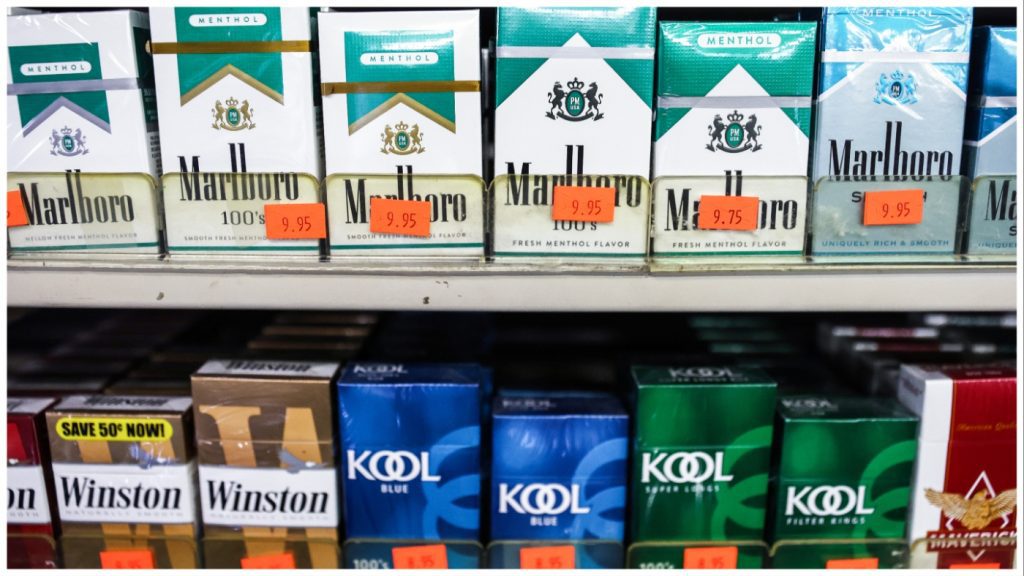The White House missed the deadline to make a rule to ban menthol cigarettes, causing public health advocates to worry that the policy will be delayed because of election year politics.
To push the administration to take action, three anti-tobacco public health groups sued the Food and Drug Administration and the Department of Health and Human Services.
The groups said in their complaint that because the administration did not act, tobacco companies continued to use menthol cigarettes to target young people, women, and the Black community, which harms public health. The complaint was filed in the Northern District of California.
Last August, health officials planned to publish the rule to ban menthol. But the Biden administration delayed the ban until March after strong opposition, including from the tobacco industry, seemed to worry the White House that the move could upset Black smokers and hurt President Biden’s reelection chances.
Yolonda Richardson, president and CEO of the Campaign for Tobacco-Free Kids, and Derrick Johnson, president and CEO of the NAACP, said that there is no reason to delay a policy that has been researched for more than 12 years. They believe that delays cost lives, especially Black lives.
Advocates for public health say that the ban would show the administration’s commitment to health equality and Biden’s Cancer Moonshot initiative.
Erika Sward, an assistant vice president at the National Lung Association, said that she thinks the president is going back on his promise to always follow science. She believes that there are no health issues more significant than tobacco.
The March deadline was for regulation rather than legislation or law, so experts say there’s no real pressure for the administration to act immediately.
The Office of Management and Budget (OMB) has been meeting with various groups, including tobacco industry lobbyists, public health advocates, related organizations, and civil rights groups for months.
There is one more meeting about the rule on the OMB's public calendar with lobbying firm Forbes Tate Partners, which represents tobacco industry giant Altria.
OMB chose not to comment on a rule that is still being reviewed.
Carol McGruder, a co-chair of the African American Tobacco Control Leadership, which is part of the lawsuit, said the aim is to show the administration that tobacco companies are not the only ones being heard.
McGruder said, “We want the Biden administration and our people to know that we are still pushing forward. We are here, we are not going anywhere, and we will continue to work until we get a rule passed.”
A possible prohibition of menthol cigarettes has been talked about for more than ten years by multiple administrations.
In 2009, Congress prohibited flavored cigarettes under a law granting the FDA power to regulate tobacco products, but it did not include menthol. The FDA was left to make a further decision.
In 2020, the same three groups sued the agency over menthol, claiming that the FDA had unreasonably delayed taking action to ban it. The lawsuit asked the court to compel the FDA to decide on adding menthol to the list of banned flavors.
After the FDA finally proposed a rule in 2022, estimating that banning menthol could prevent 300,000 to 650,000 smoking-related deaths over several decades, mostly among Black Americans, the groups voluntarily dropped the lawsuit.
Public health groups were hopeful but kept their options open.
Chris Bostic, policy director for Action on Smoking and Health, expressed that they were aware that despite the FDA's statement, it did not guarantee a rule that could actually ban menthol from the market, so they left the option to refile a new lawsuit on the same grounds.
When the March deadline passed, the groups decided they needed to take action.
Laurent Huber, the ASH Executive Director, expressed extreme disappointment in having to file a second lawsuit against the FDA to protect Americans from menthol cigarettes, citing the FDA's own research confirming that a menthol ban would save lives with no scientific reason to delay finalizing the rule.
The complaint stated that the FDA and HHS have been aware of menthol's risks since 2011 but have failed to act, engaging in a series of inadequate measures, contradictory statements, and delays.
Opponents of the ban have argued that it will increase an illegal, unregulated market for menthol cigarettes and lead to more policing in communities of color, similar to the war on drugs campaign of the 1980s and 1990s.
However, the policy would only affect companies that produce, distribute, or sell menthol cigarettes, not individuals who have or use them.
Advocates are concerned that if the White House waits until after the election, a potential GOP-controlled Congress and a second Trump administration could undo the rules through the Congressional Review Act.
The law permits Congress to overturn agency rules within 60 congressional session days of when a regulation is finalized.
But anti-tobacco advocates do not want it to reach that point.
Stanton Sward of the National Lung Association stated that it is rare for the president to, on his own, without Congress, without needing to navigate through any legislative process, do something that will save hundreds of thousands of lives and prevent another generation from becoming addicted to tobacco products.









